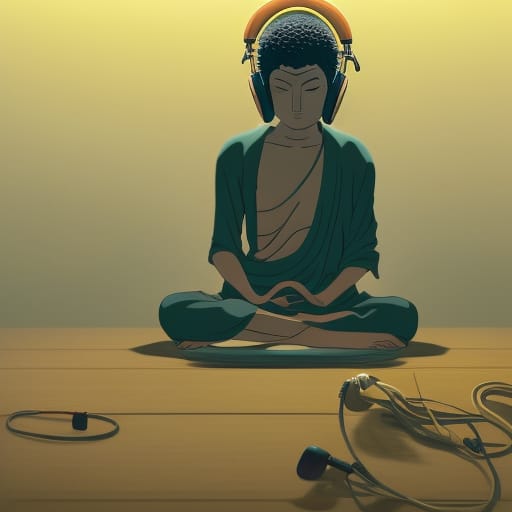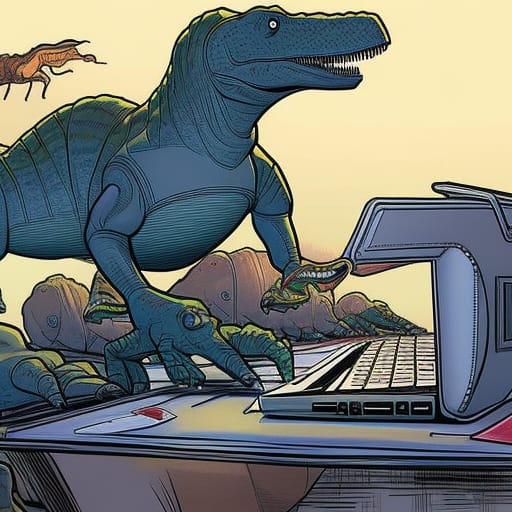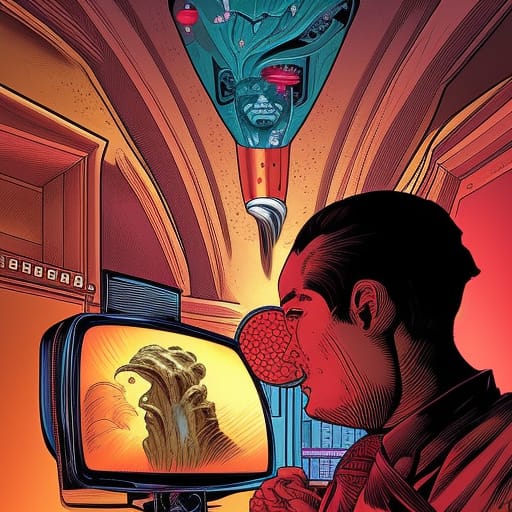The Pursuit of Learning
It's time to take schools to school and teach a whole new lesson in teaching.

"All of us need to be liberated from our culture to a certain extent,
because, education is a kind of necessary evil,
and when the process of education, or acculturation, has been completed,
we need a cure for it.
~Alan Watts"
I heard this for the first time while listening to one of Alan's lectures about Zen Buddhism. It has since replayed itself several times in my head and the reason for that, is because it is true. Education is necessary, very much so, but is it necessary in its current form? I don't think so.
There is a saying, which I think applies to a lot of areas in life, that goes, "If something is difficult to do, you are either doing it wrong, or you do not have the correct tool". Teaching a classroom full of kids is difficult. Teachers are criminally underpaid and undervalued for their role in shaping the brains of our future generations, and it still boggles my mind that education is not an area that is heavily invested in by governments. I can think of no greater asset, no greater return on investment, than the youth of today. However, I've run myself aside, teaching a classroom full of kids is difficult, and returning to the saying, because we are either doing it wrong, or we do not have the correct tools.
Before we get into various techniques, curricula, or the tools that teachers utilize, it is imperative that we examine the methodology for how we administer education:

Kids do love to learn, teenagers love to learn, adults love to learn.... at least at first. Or at least about the things they want to learn about. Somewhere along the line, education gets forced upon us. Perhaps it's a subject that becomes insufferable, perhaps it’s the teacher that sucks the fun right out of learning, but once it becomes required, once autonomy is removed from the learning equation, that is where we begin to fall out of love. That is the first problem that we will need to tackle.
The next problem is a lack of critical thinking. Most classrooms, at least when I was school age, tested knowledge by challenging the students on how well they could memorize facts. Information is taught to the students, and then they are expected to remember that information long enough to pass the test for that section, after which there is very little use for holding on to that knowledge. While minds are malleable to some extent, the ability to regurgitate specific information is becoming increasingly irrelevant thanks to the internet and its wealth of resources. The ability to seek out and find information, whether physically or virtually, is a far more useful skill to cultivate. Learning to analyze information in a way that distinguishes opinion vs fact, and the ability to trace information back for accuracy are just as vital. These skills help determine what is correct from what we are told is correct, and in effect, help teach us the system of how things work.
I don't mean system as in procedural, doing this before you do that, follow in order. No, it's more in the context of a model. Understanding the components and movements behind the clock face, so to speak. Learning how to analyze a situation, what information is needed, who the decision effects, when is it applicable, and why we arrived to a particular decision. Understanding the relevant variables behind the fact allows for more exploration of the possibilities, and allows for better understanding of what went wrong, if that is what the situation calls for. Encouraging this mindset will not be easy because it actively encourages the student to challenge the teacher rather than to obediently accept information, though it is a challenge that must be willingly accepted if we are to foster positive mindsets for learning. This is a challenge that fosters critical thinking.
The next issue that we need to factor in is scheduling and the use of time. Where my viewpoints differ from the world of today, is that, for the purposes of worldbuilding, the 9-5 grind is no longer the standard. In fact, the obligation to work is no longer the standard. This is something that I will explore further in another post, but for the sake of tying this to present day, learning doesn't have to be confined to working hours, homework doesn't always have to be done indoors during times that could be better spent with one's family. In fact, if learning becomes something we feel obligated or duty-bound to trudge through, then how effective can it really be? If learning is truly a lifelong pursuit, then perhaps there is a better way to incorporate that into life.

Before I move further into this topic, I'd like to explore a thought with you. Anyone who has studied the mind for any length of time will likely all agree that memory, your recall function, is dubious at best. The emotions you felt at a given moment will taint how you remember events because your main takeaway from said event is that you felt "x", and because you felt "x" the prominent memories your mind recalls will be the sequence of events that lead to "x", and as time distances you from said event, the fewer details will be remembered and the more your mind will have to fill in the blanks, and the more your mind fills in the blanks, the more it tries to tie it to that emotion.
Whether you were scared, happy, nervous, sad, or any of the other numerous emotional states, your mind will color your memories to match that state. This, coupled with the fact that your mind will invent information in order to tie actions to an already assumed conclusion, makes one wonder if the testing of memory is really the best way that humans learn. There are instances of people who have greatly expanded their capacity for memory (such as learning over 100,000 digits of pi), and the way that they managed to accomplish such a feat may be a great clue as how to better teach future generations. They accomplished these feats by creating a story. Creating a story around the facts. Facts that could be remembered because the story was entertaining enough to be remembered.

The questions thus far:
- How can we best use intrinsic motivation to help foster a pursuit of continuous education?
- How can we best utilize our affinity for interesting narratives to enhance educational outcomes?
- What will help challenge viewpoints and allow people to naturally come to their own conclusions?
- Should education be standardized, or should people be free to learn as they see fit?
- Where do technology and community play a role in all of this?
When I reflect on the times when learning was the most enjoyable, there are two scenarios that come to mind. The first is when the teacher was enthusiastic about the subject matter. For instance, I find that history is a relatively boring subject. It's not something that I find as interesting as others may find it. However, I distinctly remember one teacher that was absolutely passionate about the subject matter, and through that passion he was able to relay to his students with zeal the information required for the course. The interesting bit here is that I don't really remember what was taught in the class, but I do remember that it was an enjoyable experience and that I performed well that semester. I might have even come to appreciate learning history, if it weren't for having the opposite experience with my next teacher in that subject.
The second scenario where I found learning enjoyable, was almost any time that learning was tied to a video game. I've played more than my fair share of point & click adventure games in my youth, and most of those games were mostly a story driven narrative built around learning a certain subject matter. Gamification of a subject matter might be the best way we've ever tricked ourselves into learning. There's challenge in solving puzzles, a small reward for doing well, a progression in the larger narrative, and the ultimate payoff in the end of understanding the subject and finishing the story once you've mastered the game. Balancing the difficulty is key, but the intrinsic motivation that can be harnessed from video games if a force to be reckoned with and should be utilized to make learning more enjoyable at all levels.
Between passion and gamification, there exists a wide variety of options at our disposal for how we can shape the schools of the future, how we pass along knowledge, and how we can continue to encourage learning beyond the base level. It's hard to deny the lessons in social skills that are gained from being in a classroom with likeminded and/or like-aged individuals but confining a classroom to a school may no longer be needed. With advances in Augmented and Virtual reality, lessons could be taught at any time of the day, or night. Get people outside for stargazing with a side of astrophysics, meet by a body of water for a swim and a lesson in conservation, gather around a fire for a story and a chemistry lesson. The possibilities are endless, and the schedules can be ever varied. Sign up for the classes you are interested in, or be productive in other ways if that is what you'd much rather do.
I know from this, there are some that will think there should be standardized lessons required for all people to learn before they are set loose on their own path. I'm not one of those people. For the youth, their parents or guardians should have a vested interest in growing the next generation, and there should be tools and resources that encourage them to do so. There will be basic skills that need to be taught, yes, however, if the previous generation can see value in learning those lessons, then the next generation will also see the value in those lessons as well. Or they will challenge then completely and learn a lesson either way.
Which camp do you fall in? Should people be free to learn as they please, or should there be strict guidelines for what is learned and when? I think it can be universally agreed that education should be something that is encouraged, but I also think we should be honest with ourselves about how humans operate best and devise a new system. Feel free to let me know your thoughts in the comments. Only together will our ideas make a stronger world.
Hope you have a great rest of your day, don't forget to subscribe if you want to be the first to know when more updates are available, and as always, thanks for reading! :)
